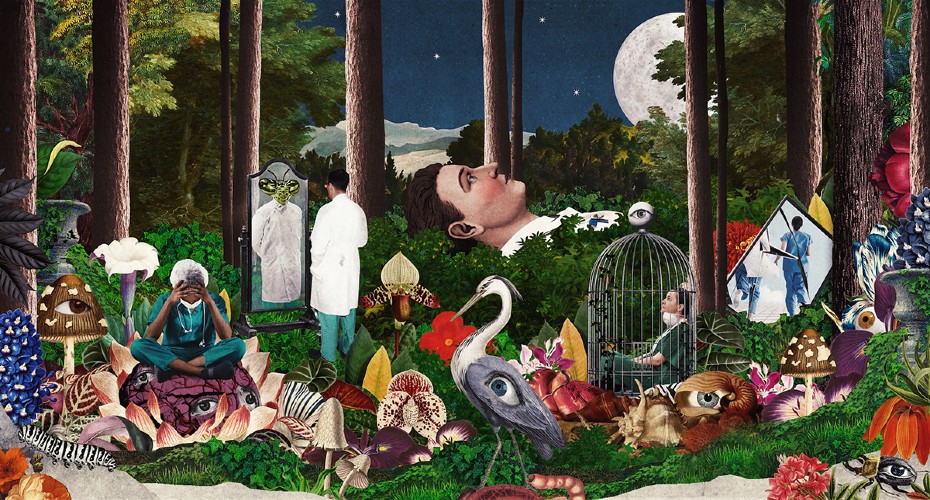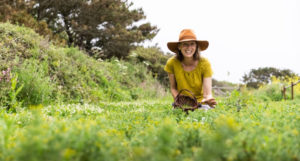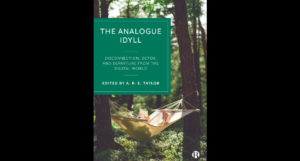New Interactive Display Explores Shame in the Medical Profession

Image: The Nocturnists’ ‘Shame in Medicine: The Lost Forest’ © Beppe Conti 2022
A multi award-winning podcast and a series of 11 beautifully emotive artworks explore shame in the medical profession, as part of a new interactive display at the University of Exeter’s Streatham Campus.
The display brings together artwork and some of the audio from the ten-part documentary podcast series ‘Shame in Medicine: The Lost Forest’. The series was produced by The Nocturnists, an award-winning independent medical storytelling podcast hosted by physician Emily Silverman, and in collaboration with the Shame and Medicine project which is being led by researchers at the University of Exeter’s Centre for Cultures and Environments of Health with funding from the Wellcome Trust.
The aim of the Shame and Medicine project is to explore the role of shame in various aspects of health and medicine, including clinical practice, patient experience, and medical student education.
The new display features 11 artworks by Italian illustrator and visual designer Beppe Conti, each artwork representing a different part of the 10-part episode podcast and the overall podcast series. Conti’s work takes the form of digital collage often exploring complex issues through surreal compositions. In 2022, the main banner image for the series (pictured above) won the silver medal in the ‘Educational and Scientific’ category at Autori di Immagini, a significant annual art competition in Italy.
Viewers to the display are encouraged to follow a QR code to listen to clips from the podcast. ‘Shame in Medicine: The Lost Forest’ brings together voices and stories from healthcare workers across the UK and USA, each episode exploring a different story of shame within the medical profession. The stories come from healthcare workers at different points in their career, working in different parts of the medical profession.
Since its release in Autumn 2022, ‘Shame in Medicine: The Lost Forest’ has been nominated for and won a range of awards, including a Sharp Index Award for Media Leadership (2022), a Gold-winning project at the 2nd Annual Anthem Awards 2023), nominated for an Ambie Award in the ‘Best Indie Podcast’ category (2023), and winner of the Silver Award in the Health and Medical Podcast Category at the 2023 New York Festivals Radio Awards.
Professor Luna Dolezal, Principal Investigator, Shame and Medicine Project, said: “Shame is everywhere in healthcare but remains unnamed and unaddressed. Despite the destructive effect that shame is having among clinicians, very little research or public storytelling exists about shame in healthcare.”
“We hope this new display and accompanying artworks will bring to life the various types of shame experiences healthcare workers shared in the powerful stories featured in The Nocturnists’ podcast series. It was exciting to work with Beppe Conti, who is a really talented artist. These artworks are not only beautiful in their own right, but are wonderful accompaniments to the storytelling. We are delighted to see them on display at the University in the Queen’s building.”
Naome Glanville, Arts and Culture Co-Ordinator added “These sumptuous artworks by Beppe Conti not only speak to the issues raised in the medical storytelling podcasts The Nocturnists but are visual stories in their own right. Each work is a feast for the eyes, a rich jewel, full of meaning. We hope people will enjoy the images and explore the audio stories behind them.”
You can see The Nocturnists’ ‘Shame and Medicine: The Lost Forest’ in the Arts and Culture Queen’s Building display space (in the west wing foyer of Queen’s Building) on the University’s Streatham campus from 28th April – 15th June 2025. The building is open from 9am-5pm Monday-Friday and admission is free. You can also listen to the podcasts and see the accompanying artworks here.
The display is funded by the Wellcome Trust [217879/Z/19/Z], the Centre for Cultures and Environments of Health, University of Exeter with support from Arts and Culture, University of Exeter.



